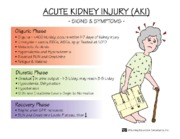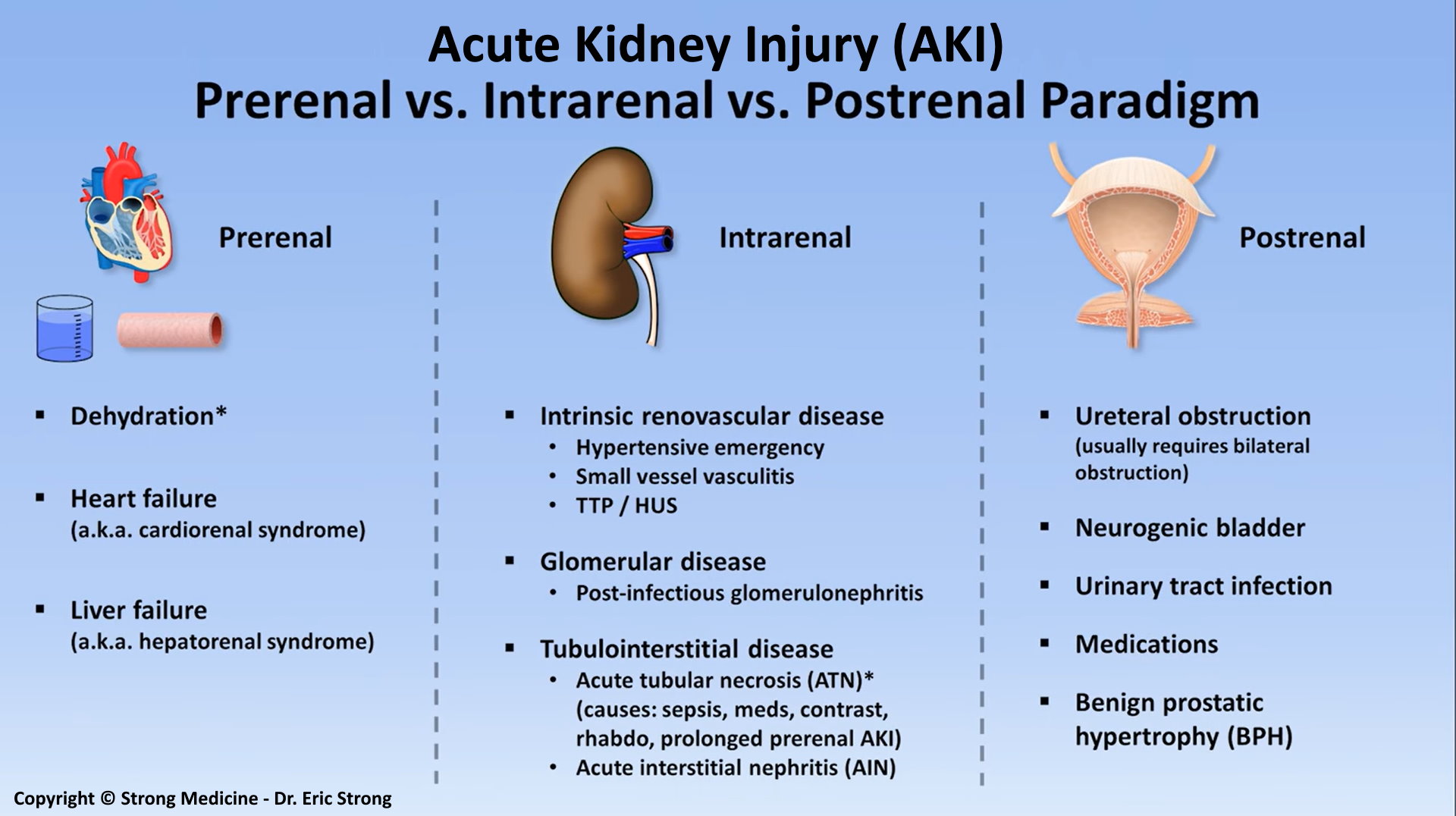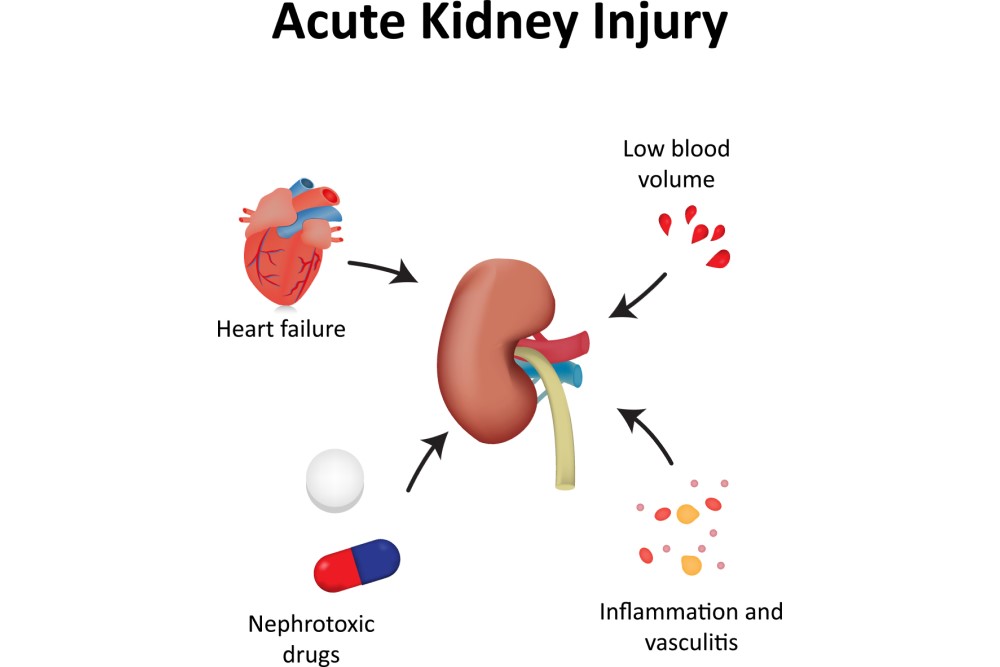Acute Kidney Injury Symptoms _ Acute Kidney Injury (AKI) > Fact Sheets > Yale Medicine
Di: Luke
An acute kidney injury doesn’t always cause noticeable symptoms during the early stage.
Acute kidney injury: prevention, detection and management
This condition develops rapidly, in hours or days, and is common in critically ill patients. 7 Figure 1 is a suggested approach to the . Learn about the symptoms, risk factors, and . Many times, diagnosis . The portal uses cookies to provide service functions such as “Bookmark” and to improve website usage. • passing less urine compared to . It is often caused by ‘stress’ on the kidney from problems elsewhere in .Acute kidney injury (AKI) describes a spectrum of injury to the kidneys which can result from a number of causes which may co-exist.Practice Essentials.Acute kidney injury can happen to anybody when there is: an obstruction that prevents urine leaving the kidney (i.Symptoms may include swelling, nausea, fatigue, itching, difficulty breathing, and symptoms of the disorder that caused the acute kidney injury. The definition of acute kidney injury has changed in recent years, and detection is now mostly based on monitoring creatinine levels, with or without urine output.In der Leitlinie der internationalen Organisation KDIGO (Kidney Disease – Improving Global Outcomes) wurden die Begriffe akutes Nierenversagen und akute Nierenschädigung unter der akuten Nierenschädigung (Acute Kidney Injury/Impairment, AKI) zusammengeführt, um das breite Spektrum von milden, reversiblen .comEmpfohlen auf der Grundlage der beliebten • Feedback
Acute kidney injury
These indicate . no urine output or high urine output. It can be caused by many factors, such as .Acute kidney injury (AKI) describes a sudden loss of kidney function that is determined on the basis of increased serum creatinine levels (a marker of kidney. Symptoms include anorexia, nausea, vomiting, and fluid and electrolyte disorders.If you do have symptoms, these may include: producing less urine.Acute kidney injury is a rapid (days to weeks) decline in the kidneys’ ability to filter metabolic waste products from the blood. We use these tests to diagnose an acute kidney injury: Blood tests: Blood tests can show changes to potassium, phosphorous and sodium levels.People with kidney failure have an eGFR of less than 15 for 3 months or more (confirmed with repeat testing to make sure you don’t have acute kidney injury) or they are on .

Kidney failure (ESRD)
Management of acute kidney injury is primarily supportive, with the goals of preventing further damage and promoting recovery of renal function. Treating the underlying cause of your kidney injury.The signs and symptoms of AKI can differ depending on many factors like the cause, severity, and your other health conditions. Acute kidney injury (AKI) is a clinical syndrome manifested by a rapid or abrupt decline in kidney function and subsequent dysregulation of the body electrolytes and volume, and abnormal retention of nitrogenous waste.Go to: Objectives: Identify the risk factors and clinical indicators associated with acute kidney injury to facilitate early . The passing of cola-colored urine may indicate a number of kidney diseases that damage the glomeruli, the filtering units of the kidney. Sometimes, there are no symptoms, so it’s important to see your doctor for a Kidney Health Check if you become unwell.
Phases of Acute Renal Failure: Symptoms, Treatment, Outlook
Clinical Practice Guideline Acute Kidney Injury (AKI)ukkidney.
Acute kidney injury: causes, treatment
Symptoms include feeling . Acute kidney injury often gets better in a few days or weeks.AKI is a rapid decrease in renal function that causes nitrogenous products to build up in the blood and may reduce urine output.

Acute kidney injury (AKI), previously called acute renal failure (ARF), denotes a sudden and often reversible reduction in kidney function, as measured by glomerular filtration rate (GFR). feeling generally ill, like a hangover. Read here about the symptoms, causes and treatment .Acute kidney injury is a rapid decline in kidney function that can be caused by conditions that decrease blood flow, damage the kidneys, or block urine flow. due to kidney stones or an enlarged prostate). [ 1] The change in terminology emphasizes that kidney injury presents as a disease spectrum from mild renal impairment to severe renal failure. AKI is characterized by an acute decrease in renal function that can be multifactorial in its origin and is associated with complex pathophysiological . Kidney disease refers to any condition that damages the kidneys, the two bean-shaped organs located on each . abdominal pain.orgAcute Renal Failure: Signs and Symptoms – Verywell Healthverywellhealth. They depend on the underlying cause, but some of the most common symptoms include: hemorrhage (heavy bleeding) fever. This condition affects other organs in the body if not treated promptly and can .

Learn about the common causes, symptoms, .Acute kidney injury (AKI) in patients with cirrhosis is a diagnostic challenge due to multiple and sometimes overlapping possible etiologies.Acute kidney injury (AKI) is defined by a sudden loss of excretory kidney function.5 mmol/L), usually resulting from decreased renal . severe vomiting.
:max_bytes(150000):strip_icc()/acute-renal-failure-symptoms-5ae1f536ff1b780036287ecb.png)
Acute kidney injury is a rapid decrease in renal function over days to weeks, causing an accumulation of nitrogenous products in the blood (azotemia) with or without reduction in amount of urine output. Learn about the common signs and symptoms of AKI, such as decreased . Symptoms may include swelling, nausea, fatigue, itching . If you’re hospitalized for another issue, our team monitors your kidneys for signs of injury.
Acute Kidney Injury
bloody diarrhea. It can be due to: an injury or illness — such as severe dehydration, or an infection; drugs or poisons

Hashmi, Khalid Bashir
Acute kidney injury: Symptoms, causes, treatment, and more
Treatment for acute kidney failure involves identifying the illness or injury that originally damaged your . In some cases, AKI causes no symptoms and is only diagnosed after a test has been run by your doctor.Also called acute renal failure, or ARF, acute kidney injury (AKI) is a serious health condition that affects the kidneys and secondarily, other major bodily organs, such as the heart, lungs and liver.5% in hospitalized patients and that reaches up to 50–60% in critically ill patients [1,2,3,4,5,6].If your blood has too much acid due to acute kidney failure, you can end up with nausea, vomiting, drowsiness, and breathlessness.Acute kidney injury, previously known as acute renal failure, encompasses a wide spectrum of injury to the kidneys, not just kidney failure. It can range from minor loss of kidney function to complete kidney failure.

Acute kidney injury (AKI) is a frequent diagnosis with an incidence that varies from 5. When your body’s fluids and electrolytes are out . If you’re not in the hospital but have symptoms of kidney injury, your doctor will ask about your symptoms, what medicines you take, and what tests you have had .Acute kidney injury (AKI) is a sudden decline in kidney function that causes waste products to accumulate in the body. The various symptoms of acute kidney injury result from the various disturbances of kidney function that are associated with the disease. AKI usually starts quickly, limiting the kidneys’ ability to filter toxins in the bloodstream. Noticeable symptoms may include: A decrease in urine. Loss of appetite, nausea, and vomiting: This .Symptoms of an acute kidney injury come on suddenly, over the course of hours or days.Acute kidney injury (AKI) describes a range of conditions in which nephrons are damaged, impairing their function and reducing the efficiency of . It is characterized by a sudden decline in renal excretory function over hours or days that can result in failure to maintain fluid, electrolyte, and acid-base balance. being very thirsty. The most common symptoms of are: Lack of energy and fatigue: This is the result of early dysfunction of the organs in your body, which do not have the right concentration of electrolytes to function as they should. AKI, previously known as acute renal failure (ARF), is an acute decline in renal function, leading to a rise in serum creatinine and/or a fall in urine output.Acute kidney injury (AKI), .People with acute kidney injury may develop more serious symptoms of chest pain, muscle twitching, or even seizures. If fluid accumulates in the lungs , people may become short of breath.Acute kidney injury (AKI) is commonly associated with sepsis, cardiovascular collapse, congestive heart failure, major surgery, nephrotoxins (such as antibiotics, .Acute kidney injury: Summary. the effects of certain .orgAcute Kidney Injury (AKI) | Nephrology | Renal | Geeky . Acute kidney injury .comEmpfohlen auf der Grundlage der beliebten • Feedback
Acute Kidney Injury
low blood pressure, called hypotension, which can occur as a result of: heart attack. Accumulation of urea and other nitrogen-containing substances in the bloodstream lead to a number of symptoms, such as fatigue, loss of appetite, headache, nausea, and .AKI is a sudden episode of kidney damage or kidney failure that can cause harmful toxins and fluid to build up in your body. swelling of the legs or feet. It can develop quickly — over a few hours or days. Serious complications . It aims to improve assessment and .
Acute Kidney Injury (AKI) > Fact Sheets > Yale Medicine
AKI is part of a range of conditions summarized as acute kidney diseases and disorders (AKD), in which slow .How long you’ll stay in the hospital depends on the reason for your acute kidney failure and how quickly your kidneys recover. feeling or being sick.acute kidney failure (also called acute renal failure, or acute kidney injury) chronic kidney disease; Acute kidney failure.AKI is the rapid loss of kidney function that can cause blood in stools, breath odor, bruising, fatigue, and other symptoms. It can be caused by reduced blood flow, direct . Causes include conditions that decrease blood flow to the kidneys, that damage the kidneys themselves, or that block drainage of urine from the kidneys.In all cases of acute kidney injury (AKI), creatinine and urea build up in the blood over several days, and fluid and electrolyte disorders develop.Acute kidney injury (AKI) is a sudden and recent reduction in the level of kidney function. Find out more about the symptoms, causes, and treatment. pulmonary embolism. Acute kidney failure is the short-term loss of kidney function. The most serious of these disorders are hyperkalemia Hyperkalemia Hyperkalemia is a serum potassium concentration > 5. The widely accepted Kidney Disease: Improving Global Outcome (KDIGO) definition of AKI is based .
Kidney failure
Acute kidney injury (AKI), also known as Acute Renal Failure (ARF) occurs when the kidneys lose their filtering ability resulting in the build-up of waste products in the blood.The signs and symptoms of acute kidney injury may differ depending on the root cause of the kidney injury and from person to person.Acute kidney injury (AKI) is the sudden and often temporary loss of kidney function.Acute kidney injury is most often diagnosed during a hospital stay for another cause.Symptoms of acute kidney injury may include: • water retention which may cause your ankles, face or hands to become swollen or puffy.Acute kidney injury is common and can be life-threatening if left untreated. The diagnosis of AKI and its staging is . Muscle weakness.Symptoms of acute renal failure develop quickly, over several hours or days.

It often results from inadequate renal perfusion due to severe trauma, illness, or surgery but is sometimes caused by a rapidly progressive .
Acute kidney failure
Acute kidney injury (AKI) is where your kidneys suddenly stop working properly.Acute kidney injury is a clinical syndrome characterized by a rapid decline in glomerular filtration rate and resultant accumulation of metabolic waste products. If you are already in the hospital, tests done for other problems may find your kidney problem. This guideline covers preventing, detecting and managing acute kidney injury in children, young people and adults. Acute kidney injury (AKI) describes a spectrum of injury to the kidneys which can result from a number of causes which may co-exist.
Acute Kidney Injury
Doctors usually say AKI is severe when the kidney function, measured by blood tests, has dropped by one half (50%).
Kidney Disease: Acute, Chronic, Symptoms, and Stages
Swelling in your legs, ankles, or feet. In some cases, you may be able to recover at home. If symptoms do happen, they may include .Acute kidney injury (AKI) is a sudden episode of kidney damage or failure that can cause waste products to build up in the blood.Autor: Abhinav Goyal, Parnaz Daneshpajouhnejad, Muhammad F.Acute Kidney Injury (AKI) > Fact Sheets > Yale Medicineyalemedicine.
- Achteck Zeichnen Lösungen _ Mach mit!: Übung 2
- Acer Notebook Günstig Kaufen : Laptops & Notebooks jetzt online kaufen
- Adelskrone Mit Blättern : Hängende Bäume » Eine Auswahl der schönsten Sorten
- Acteur Französisch – acteur français
- Address Claiming J1939 : SAE J1939
- Addison Krankheit Behandlung : Behandlung » Addison-Krise » Krankheiten » Internisten im Netz
- Adam Fields Tube Dysfunction : Management of Eustachian Tube Dysfunction: A Review
- Active Directory Query Tool , The 12 Best AD Tools for Windows in 2024 (Free & Paid)
- Activar Keybinds En Discord _ BEST DISCORD hotkeys/keybinds for MUTE and DEAFEN! #shorts
- Ad Blocker Für Joyn Deaktivieren
- Acronis Tib Image Erstellen | Acronis True Image 2021
- Action Bielefeld Nordpark Öffnungszeiten
- Addison Installation , DVD 3/2021